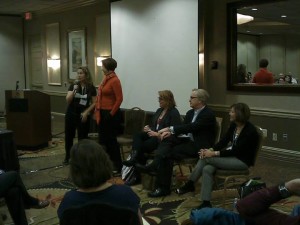(This was originally published by Senia Maymin on www.profitfromthepositive.com.)
Each of us wanted to share a few key pieces of advice with those who attended and with those who didn’t have a chance to attend. Here is our advice:
Senia Maymin, MAPP ’06
(senia@ProfitFromThePositive.com. Website: ProfitFromThePositive.com. Senia says, “If you’re moved to do so, we’d greatly appreciate an Amazon review.” On Amazon at http://tinyurl.com/profitpositive.):
- Take outward actions. We can always take inward actions (like updating our website, thinking about process, writing down an outline for a presentation), but you’ll get more impact from your eventual client by reaching out, and trying to do something with a client. Take outward action.
- Tell stories. When you want to describe your service, tell stories of how other companies have used it. For example, “For Intel, I presented to 250-300 employees on productivity, and it was the largest attendance they’ve ever had for a book author. The committee that invited me got asked for more presentations like this one.” Tell stories.
(info@shannonpolly.com. Website: www.shannonpolly.com. Shannon says, “Follow me on twitter @shannonpolly, and @positivebizdc.”):
- Connect and partner with others. Research shows the businesses that have one person at the helm do not fare as well as businesses that have more than one. If ‘other people matter’ then partner with some of them. It will give you more reach. And as Adam Grant would say, when you are reaching out, go to your weak ties and see what leads they have for you.
- Job craft. If there is a part of your business that you aren’t good at or don’t like doing, find someone who does. I partnered with two dynamic marketing women who grew our non-profit, Positive Business DC, from 0 to 1100 Twitter followers. It’s good to know your strengths and your weaknesses…and to partner with an opposite.
Pam Teagarden, MAPP ’13
(pamela@teagardengroup.com. Websites: www.teagardengroup.com; www.solunainstitute.org; www.architectsofbusiness.com; www.authentum.com. Watch for information on my book and upcoming blogs on Positive Business at www.authentum.com)
- Think like the CEO. What is he/she going to do with the outcomes of your project? Can he/she make sense of it in business?
- Business is changing in ways in which there is no precedent. Have you been mindful about what it is you are doing to insure that it is fresh, new and maps to the business drivers?
- If you can’t imagine how this will help the bottom line of the business of your client, then it will not be of sustainable value to the company (especially when it is in crisis) – even if the employees ‘really liked it.’
Dan Bowling, MAPP ’09
(dabowling@gmail.com. You can read Dan’s weekly blog at http://blog.talentmgt.com/category/psychology-at-work/ and follow him on Twitter @BowlingDan)
- “The Market Tells You Who You Are.” Find out what people are interested in paying you to do and build upon that. It might be very different than your original business plan or concept. Don’t cling stubbornly to some idea you learned in MAPP; approach positive psychology consulting with a growth mindset and be willing to change.
- “If You Give it Away for Free, How Do You Know It’s Worth Anything?” If you are going to be a professional, charge for your services. You will quickly discover what has validity and worth in the for-profit world (at least the section in which you are connected) and what doesn’t. NOTE: this does not apply to pro bono work with non-profits and those in need, etc.
- “Be Your Own Best Client.” Regularly do a positive psychology intervention with yourself. Are you properly focused on your strengths? When facing rejection, do you practice your resilience skills? Facing a tough audience, are you optimistic? Do you project well-being to everyone you meet – you are the happiness expert, remember?
- “Don’t Run Away from Positive Psychology.” What differentiates you from the thousands of independent consultants out there? You have an Ivy League degree in positive psychology. Sure, the term may turn some people off, but others are turned on by it. You start with a tremendous competitive advantage with this group if you embrace the term.
Margaret H. Greenberg, MAPP ’06
(margaret@TheGreenbergGroup.org. Websites: www.TheGreenbergGroup.org and www.ProfitFromThePositive.com. Margaret says, “Like us on www.Facebook.com/ProfitFromThePositive.”)
- Start with WHAT and WHO you know. If HR is your background, start applying positive psychology there. If law is your background, start there. You get the picture. You’ll gain more credibility and can leverage your existing network. Build and expand from there. We all came into MAPP with experiences and other tools. Don’t forget to use them.
- Start small, drop the lingo, and use the back door (Chapter 9 – The Positive Deviant). To influence, you need to speak your audience’s language. Avoid trying to “sell” positive psychology “interventions” – that’s the surest way to turn positive psychology into just another fad. Instead, start by learning more about their business and challenges and then you will know what makes sense to implement. Consider using a design team concept (e.g. – a handful of people who will be your audience/end users) to customize your approach to best meet their needs.
You are getting the advice in the order in which we sat in front of the audience: Senia–Shannon–Pamela–Dan–Margaret . We’d love to hear your key pieces of advice. Please share them with us in the comments below!

